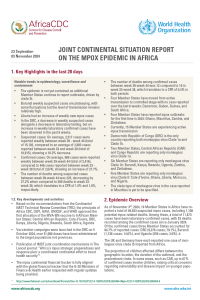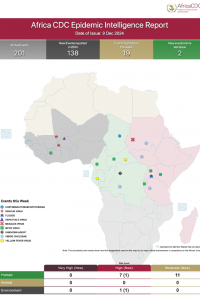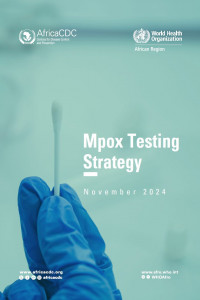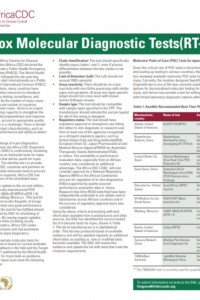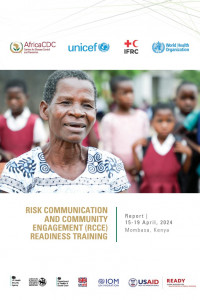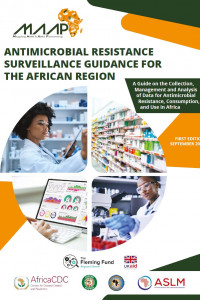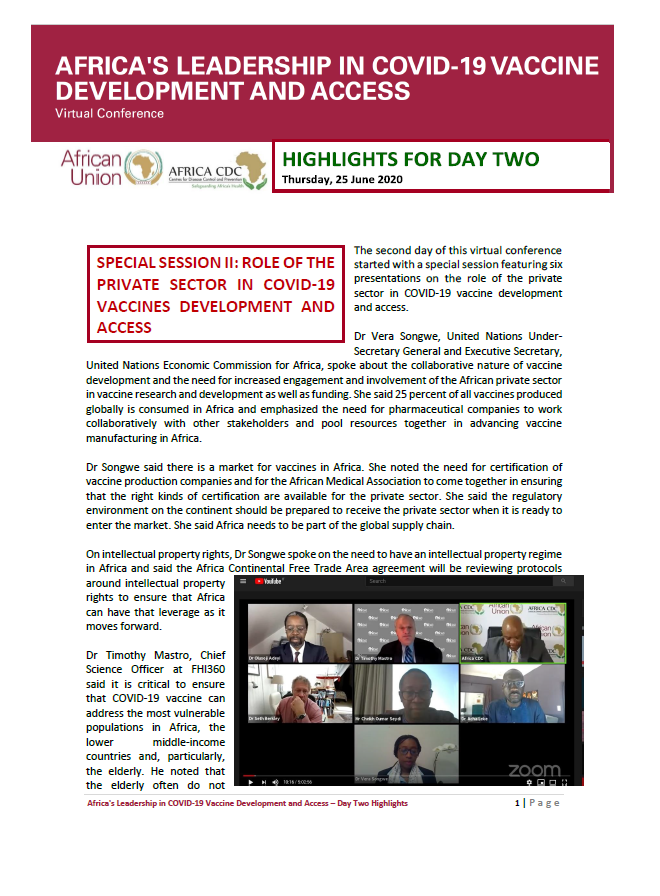
- Version
- Download 1500
- File Size 819.82 KB
- File Count 1
- Create Date 27 June 2020
- Last Updated 21 August 2020
Africa’s Leadership Role in the Development and Access to Potential COVID-19 Vaccine: Highlights for Day Two
SPECIAL SESSION II: ROLE OF THE PRIVATE SECTOR IN COVID-19 VACCINES DEVELOPMENT AND ACCESS
The second day of this virtual conference started with a special session featuring six presentations on the role of the private sector in COVID-19 vaccine development and access.
Dr Vera Songwe, United Nations Under-Secretary General and Executive Secretary, United Nations Economic Commission for Africa, spoke about the collaborative nature of vaccine development and the need for increased engagement and involvement of the African private sector in vaccine research and development as well as funding. She said 25 percent of all vaccines produced globally is consumed in Africa and emphasized the need for pharmaceutical companies to work collaboratively with other stakeholders and pool resources together in advancing vaccine manufacturing in Africa.
Dr Songwe said there is a market for vaccines in Africa. She noted the need for certification of vaccine production companies and for the African Medical Association to come together in ensuring that the right kinds of certification are available for the private sector. She said the regulatory environment on the continent should be prepared to receive the private sector when it is ready to enter the market. She said Africa needs to be part of the global supply chain.
On intellectual property rights, Dr Songwe spoke on the need to have an intellectual property regime
in Africa and said the Africa Continental Free Trade Area agreement will be reviewing protocols around intellectual property rights to ensure that Africa can have that leverage as it moves forward.
Dr Timothy Mastro, Chief Science Officer at FHI360 said it is critical to ensure that COVID-19 vaccine can address the most vulnerable populations in Africa, the lower middle-income countries and, particularly, the elderly. He noted that the elderly often do not respond well to vaccines and that prevalent infectious diseases and other health conditions in many countries, including African countries, lead to a decreased vaccine responsiveness among populations. For this reason, he said it is important to learn how to reach adults with coded vaccines when they become available.
Dr Mastro said access to good data is important for advocacy to reach populations most in need of protection.
In his presentation, Dr Seth Berkley, Chief Executive Officer, Gavi, the Vaccine Alliance, said Gavi and CEPI are leading the COVID-19 vaccine efforts globally with WHO. He said there are over 220 vaccines in development and 15 in clinical trials, some of which are in their phase two and some moving to phase three trials. This, he said, is the largest vaccines portfolio ever. He said the vision of the vaccine facility is to have two billion vaccine doses available by 2021 and to have these vaccines distributed at the same time in developed and developing countries. He, however, warned that they are not sure which of those vaccines would work, so they are trying to have a very large portfolio. [...]
Attached Files
| File | Action |
|---|---|
| Highlights for Day Two (English) | Download |

